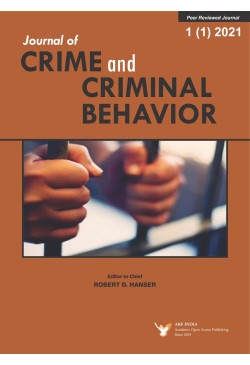JCCBJournal of Crime and Criminal Behavior

Peer Reviewed Journal

Peer Reviewed Journal
Intimate Partner Femicides in Eswatini: Victims, Assailants, Offense Characteristics, and Sociocultural Contexts
The article analyzes 145 intimate partner femicides that occurred in Eswatini, Africa, during 2009-2022. Data were obtained through in-depth surveillance of two prominent national daily newspapers. Results show that assailants and victims generally shared a lower socioeconomic status. Stabbing, shooting, and beating were the dominant homicide methods and overkill was a significant feature of partner femicides. Perpetrator suicides occurred in 29% of cases. Ten cases had 11 collateral murder victims. Male sexual jealousy and rage over the victim’s decision to terminate the relationship were the dominant motivational circumstances. Recommendations for the reduction of partner femicides are discussed.
Mensah Adinkrah (2024). Intimate Partner Femicides in Eswatini: Victims, Assailants, Offense Characteristics, and Sociocultural Contexts. Journal of Crime and Criminal Behavior, 4: 2, pp. 157-180. https://doi.org/10.47509/JCCB.2024.v04i02.01
Migration and Crime: Sociological Contextualization of Colonial History
Bappi Singha (2024). Migration and Crime: Sociological Contextualization of Colonial History. Journal of Crime and Criminal Behavior, 4: 2, pp. 181-192. https://doi.org/10.47509/JCCB.2024.v04i02.02
Criminal Intelligence Management and Joint Security Operations in Benue State: Taming the Interagency Collaboration Debacle
This study examined criminal intelligence management, joint security operations and the challenges of taming inter-agency collaboration debacle in Benue State, North Central Nigeria. The study adopted the qualitative method, semi-structured Key Information Interview (KII) technique and review of relevant literature in its investigations. Based on its earlier findings, the following conclusions were reached by the study. A sample size of 23 (n-23) was determined for the study. The interview participants were recruited using the referral approach that was based on the purposive sampling technique of selecting persons with enough stock of knowledge, experience, and expertise on the topic of this study. The participants were recruited from the Nigeria Police, DSS, Nigeria Security and Civil Defence Corps, vigilante group, and, of course, the special Joint Tasks Force Operation Whirl Stroke (OPWS) fighting various kinds of crime in Benue State, particularly armed robbery, banditry, kidnapping, herders attacks, farmers-herdsmen clashes, and cattle rustling. Findings of this study showed that factors such as superiority complex, and lack of regular interaction, and ignorance about the individual complementary role of sister security agencies featured as the major factors responsible for lack of inter-agency collaboration towards exchange of raw information among the various security agencies that undertake joint security operations against criminals. The study also found that duplication of functions that often leads to jurisdictional conflicts, lack of training or education coupled with dearth of intelligence analysts, and pecuniary interest were identified as specific factors that militate against inter-agency collaboration in the production/analysis of criminal intelligence for use in joint security operations. Results of the study also showed that weak leadership on the part of both political leaders and heads of security agencies, and envy or jealousy over-perceived exclusive job assignments were identified as the main factors that militate against inter-agency sharing of criminal intelligence among security
agencies in the country. Finally, this study proffered the following recommendations. It is recommended that both the operational and governance structures of the individual security agencies in Nigeria be reformed. The reform being proposed here should aim at removing any wasteful overlaps and unnecessary duplications of duties, mutual distrust and jurisdictional conflicts that arise through encroachment on each other’s legal and operational spaces by the competing agencies. The reform here should also aim at ensuring that the duties of the agencies are properly streamlined such that information, criminal intelligence, and experience can be shared without eroding any individual mandates. Again, the study also recommended regular training programme on the modern approach to security operation known as intelligence-ledcounter terrorism (ILCT) should be organized jointly for the personnel of all the security agencies in Nigeria. As part of this training programme, it should also be ensured that the curriculum for such periodic training gives pride of place to such topics like Inter-agency collaboration (IAC) and criminal Intelligence Management (CIM).
Keywords: intelligence, crime, criminal, management, security, inter-agency, collaboration, sharing, agencies, joint, operation.
Justine Tever Gberinyer, Ike Okoro & Eric Adishi (2024). Criminal Intelligence Management and Joint Security Operations in Benue State: Taming the Interagency Collaboration Debacle. Journal of Crime and Criminal Behavior, 4: 2, pp. 193-212. https://doi.org/10.47509/JCCB.2024.v04i02.03
Beyond the Kinetic Approach to Counter Terrorism in Nigeria and Towards a Sustainable Soft Power Paradigm
Ngboawaji Daniel Nte, Major (Dr.) Awal Isa & Joda Adekunbi Omolara (2024). Beyond the Kinetic Approach to Counter Terrorism in Nigeria and Towards a Sustainable Soft Power Paradigm. Journal of Crime and Criminal Behavior, 4: 2, pp. 213-248. https://doi.org/10.47509/JCCB.2024.v04i02.04
Healthcare Cybersecurity and Cybercrime Supply Chain Risk Management
International Recruitment and Training of Correctional and Community Corrections Officers
Daniela Barberi (2024). International Recruitment and Training of Correctional and Community Corrections Officers. Journal of Crime and Criminal Behavior, 4: 2, pp. 265-288. https://doi.org/10.47509/JCCB.2024.v04i02.06